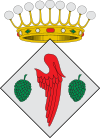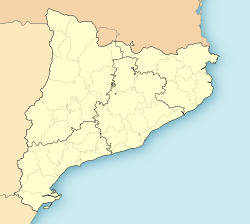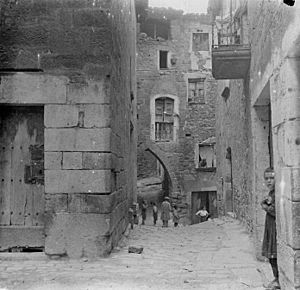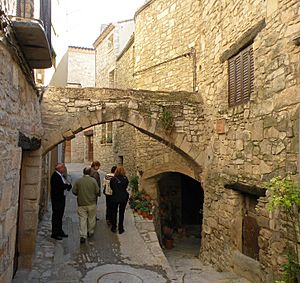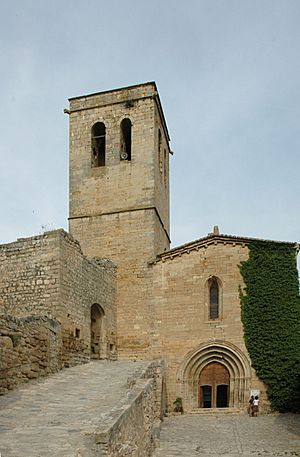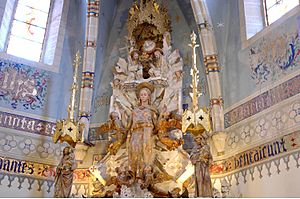Guimerà facts for kids
Quick facts for kids
Guimerà
|
||
|---|---|---|
|
Municipality
|
||
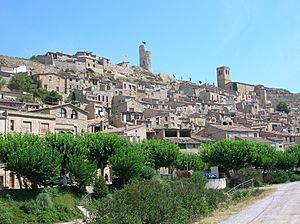 |
||
|
||
| Country | ||
| Autonomous community | ||
| Province | ||
| Comarca | ||
| Area | ||
| • Total | 25.8 km2 (10.0 sq mi) | |
| Elevation | 555 m (1,821 ft) | |
| Population
(2018)
|
||
| • Total | 270 | |
| • Density | 10.47/km2 (27.1/sq mi) | |
| Time zone | UTC+1 (CET) | |
| • Summer (DST) | UTC+2 (CEST) | |
| Postal code |
25341
|
|
Guimerà is a small village and municipality in Catalonia, Spain. It is located in the Urgell area of the province of Lleida. The village sits by the Corb river. Most of Guimerà is built on a hillside on the north side of the river. In 2011, about 320 people lived there.
| Top - 0-9 A B C D E F G H I J K L M N O P Q R S T U V W X Y Z |
History of Guimerà Village
Guimerà grew during a time when Christian forces were taking back land from Islamic rule in Spain. The village might be named after a person called Wigmar from long ago. Its large castle and tall watchtower show that it was an important place.
The first time Guimerà was mentioned in old papers was in 1038. This was in a legal document about its castle. The town slowly grew down the hill from the castle towards the river. Over time, it even spread to the other side of the river.
Guimerà's population was largest in 1857, with 1606 people. However, like many other rural areas, its population has gone down. By 2011, only 320 people lived there. Today, many buildings in the village are used as holiday homes.
What is the Economy Like in Guimerà?
The main way people make a living in Guimerà is through farming. They mostly grow crops without needing extra water, which is called dry farming. The main crops are barley and other grains. Farmers also grow olives, almonds, and grapes.
A local farming group makes olive oil that has a special quality label called "Garrigues." They also make wine with a special label called "Costers del Segre." Tourism is also very important for the village's economy. Many visitors come to see the historic sights.
Main Sights to See in Guimerà
Guimerà is famous for its well-preserved mediaeval (Middle Ages) look. Its buildings are made of limestone and are packed closely together on the hillside. Narrow streets, stairs, and even tunnels connect them. Much of the old town wall and some of its gates are still standing.
Guimerà Castle and Its History
The castle sits high up, looking over the village. It was built in the 11th century. A big part of the castle was destroyed in a battle in 1835. Since 1984, many parts of the castle have been fixed up. You can now visit the castle's restored watchtower.
Santa Maria Parish Church
The parish church of St. Mary is a large building next to the castle. It was built in the 14th century. Inside, it once had a beautiful altarpiece painted by Ramon de Mur. This artwork is now in a museum in Vic. In 1940, a new altarpiece was made by an architect named Josep Maria Jujol.
Religious Sanctuaries Nearby
About 2 kilometers west of the village is the religious place called La Bovera. It was built in the 13th century and is still used today.
The ruined convent of Vallsanta is also about 1.5 kilometers west of Guimerà. It is close to La Bovera. Cistercian nuns founded it in the 13th century. They left it around the year 1600. The convent shows different building styles from the Romanesque and Gothic periods.
Protected Historic Sites
In 1975, the Spanish Government declared the old center of Guimerà a protected national monument. The castle was also protected in 1988. The government of Catalonia lists 24 historic buildings in Guimerà village and its area.
Culture and Festivals in Guimerà
Guimerà has a mediaeval main square. Here you can find the town's museum. The museum has many old items from the Iberians (who lived there before the Romans), the Roman Empire, and the Middle Ages.
The village's biggest yearly celebration is for its patron saint, St. Sebastian. This festival happens on the weekend closest to January 20th. Since 1994, a special mediaeval fair is held every August. It brings many visitors to the village.
Transportation in Guimerà
Guimerà is the largest and westernmost village on the L-241/T-241/T-224 road. This road follows the Corb river. The spa resort of Vallfogona de Riucorb is 5 kilometers to the east.
A bus service runs twice a day between Barcelona and Guimerà. There is also a daily bus service between Vallfogona and Tàrrega. Tàrrega is 15 kilometers away and is the closest town with a railway station and motorway access.
Images for kids
See also
 In Spanish: Guimerá para niños
In Spanish: Guimerá para niños
 | Jewel Prestage |
 | Ella Baker |
 | Fannie Lou Hamer |


